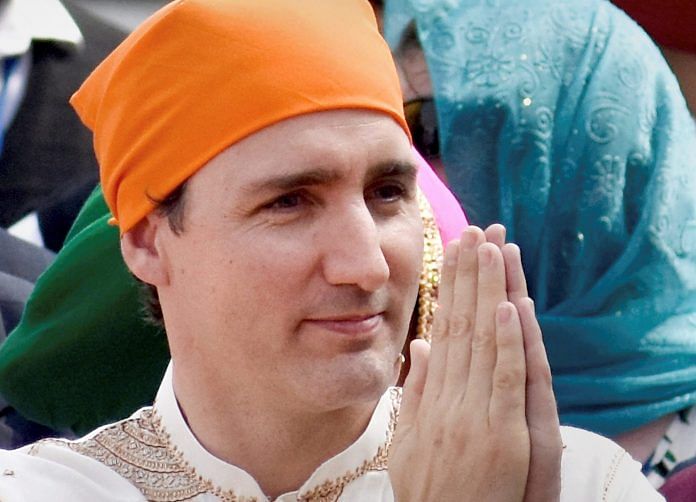The Canadian Government’s conduct with regard to Khalistani extremism has long been fairly disgraceful.
In April last year, when Canadian defence minister Harjit Sajjan was visiting India, Punjab chief minister Capt. Amarinder Singh had explicitly and publicly refused to meet with him, citing Sajjan’s Khalistani sympathies and involvement with Sikh extremist groups in Canada.
As Canadian Prime Minister Justin Trudeau’s visit to India — and his declared intention of a high profile, and for him politically crucial, visit to the Golden Temple — loomed, Amarinder Singh let it be known that he would give Trudeau a miss as well, to drive home the message of his disapproval of Canadian support to Khalistani formations and the presence of a number of Khalistani sympathisers in Trudeau’s cabinet. There are four Sikhs in Trudeau’s cabinet, including, according to Amarinder Singh, Khalistani sympathisers. There are reports that suggest that Trudeau was also somewhat reluctant to meet with the chief minister, given the previous snub to his defence minister.
Eventually, however, the two were forced together, apparently on the vigorous intervention of the ministry of external affairs, and have sought to make a virtue out of necessity. Crucially, Amarinder Singh took advantage of the opportunity to underline Punjab’s urgent apprehensions regarding Khalistani separatist activity in Canada, and presented Trudeau with a list of nine high profile individuals of concern, Category ‘A’ extremists alleged to be involved in hate crimes, terrorist activities and radicalisation.
Trudeau got his high profile ‘event’ — the visit to the Golden Temple — which is of some domestic political significance among his Sikh supporters in Canada, as well as the opportunity for a little political grandstanding about his principled opposition to separatism and equally principled commitment to free speech. He claimed that he made it “very, very clear” to the chief minister that Canada supported a united India and condemned violent extremism. Amarinder Singh expressed satisfaction over Trudeau’s “categorical assurance” on “tackling fringe separatist element” as well as hate speech.
Some inveterate optimists believe that these words are the markers of a new beginning, and that the proximate future will see abruptly stringent action against Khalistani formations and sympathisers in Canada. Such sanguinity is, however, likely misplaced.
Canada’s entanglement with Khalistani extremism is convoluted and long. Trudeau as well as a number of his ministers and prominent members of his Liberal Party of Canada have participated in a number of public events and demonstrations by Khalistani extremists. Some of these events saw open and visible participation by formations banned as terrorist in Canada, such as the Babbar Khalsa Inernational and the International Sikh Youth Federation; and were also platforms of radicalising hate speech and the open hagiography and iconization of terrorists guilty of mass murder.
Crucially, if one goes back to the devastating Kanishka bombing of 1985, in which 329 lives were lost in a Khalistani terrorist operation that blew up the Air India flight, one discovers what the belated John Major Commission described as “a cascading series of errors”. When examined, these purported ‘errors’ suggest a pattern that smacks of sustained state collusion, rather than a concatenation of mere lapses or mistakes. Not much has changed over the decades since (none of the conspirators were ever convicted, as evidence was fudged, and only the bomb-maker received an extraordinarily lenient sentence “manslaughter” after confessing to his crime).
There is, moreover, a vast difference between ‘commitment to free speech’ and active participation in Khalistani separatist demonstrations and programmes; of state funding of gurdwaras known to be controlled by radical elements, even as these gurdwaras are under investigation for financial irregularities; or dinner invitations to a convicted terrorist at events in honour of the Prime Minister of Canada, or his wife; or documented associations of convicted terrorist with Trudeau’s ministers and senior party colleagues.
The Canadian government’s conduct with regard with Khalistani extremism has long been fairly disgraceful; but it is useful to remind ourselves that India and in particular, Punjab, have not covered themselves with glory. There is an equally long tradition of appeasement here, which has allowed a Bhindranwale memorial to come up in the hallowed precincts of the Golden Temple, has seen many political luminaries share platforms with Khalistani extremists, and a continuous and polarising politics that has played on the Sikh religious identity and sentiments.
Of course, we are yet to come across a case of an Indian Prime Minister or a member of his or her family at dinner with a convicted terrorist. It is nevertheless abundantly clear that the filth of ‘politics as usual’ will continue to blight society and government, both in Canada and in India.
Ajai Sahni is the Executive Director, Institute for Conflict Management



